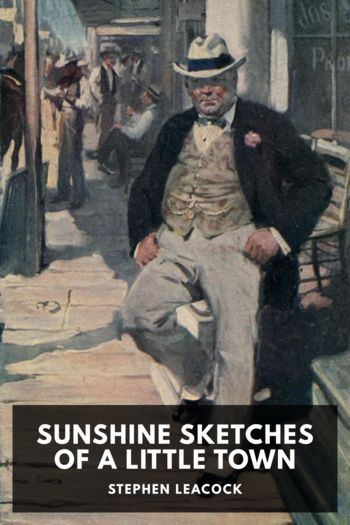Sunshine Sketches of a Little Town, Stephen Leacock [people reading books .TXT] 📗

- Author: Stephen Leacock
Book online «Sunshine Sketches of a Little Town, Stephen Leacock [people reading books .TXT] 📗». Author Stephen Leacock
What was Peter Pupkin doing, then, at eight hundred dollars in a bank in Mariposa? If you ask that, it means that you know nothing of the life of the Maritime Provinces and the sturdy temper of the people. I suppose there are no people in the world who hate luxury and extravagance and that sort of thing quite as much as the Maritime Province people, and, of them, no one hated luxury more than Pupkin senior.
Don’t mistake the man. He wore a long sealskin coat in winter, yes; but mark you, not as a matter of luxury, but merely as a question of his lungs. He smoked, I admit it, a thirty-five cent cigar, not because he preferred it, but merely through a delicacy of the thorax that made it imperative. He drank champagne at lunch, I concede the point, not in the least from the enjoyment of it, but simply on account of a peculiar affection of the tongue and lips that positively dictated it. His own longing—and his wife shared it—was for the simple, simple life—an island somewhere, with birds and trees. They had bought three or four islands—one in the St. Lawrence, and two in the Gulf, and one off the coast of Maine—looking for this sort of thing. Pupkin senior often said that he wanted to have some place that would remind him of the little old farm up the Aroostook where he was brought up. He often bought little old farms, just to try them, but they always turned out to be so near a city that he cut them into real estate lots, without even having had time to look at them.
But—and this is where the emphasis lay—in the matter of luxury for his only son, Peter, Pupkin senior was a Maritime Province man right to the core, with all the hardihood of the United Empire Loyalists ingrained in him. No luxury for that boy! No, sir! From his childhood, Pupkin senior had undertaken, at the least sign of luxury, to “tan it out of him,” after the fashion still in vogue in the provinces. Then he sent him to an old-fashioned school to get it “thumped out of him,” and after that he had put him for a year on a Nova Scotia schooner to get it “knocked out of him.” If, after all that, young Pupkin, even when he came to Mariposa, wore cameo pins and daffodil blazers, and broke out into ribbed silk saffron ties on pay day, it only shows that the old Adam still needs further tanning even in the Maritime Provinces.
Young Pupkin, of course, was to have gone into law. That was his father’s cherished dream and would have made the firm Pupkin, Pupkin, Pupkin, and Pupkin, as it ought to have been. But young Peter was kept out of the law by the fool system of examinations devised since his father’s time. Hence there was nothing for it but to sling him into a bank; “sling him” was, I think, the expression. So his father decided that if Pupkin was to be slung, he should be slung good and far—clean into Canada (you know the way they use that word in the Maritime Provinces). And to sling Pupkin he called in the services of an old friend, a man after his own heart, just as violent as himself, who used to be at the law school in the city with Pupkin senior thirty years ago. So this friend, who happened to live in Mariposa, and who was a violent man, said at once: “Edward, by Jehoshaphat! send the boy up here.”
So that is how Pupkin came to Mariposa. And if, when he got there, his father’s friend gave no sign, and treated the boy with roughness and incivility, that may have been, for all I know, a continuation of the “tanning” process of the Maritime people.
Did I mention that the Pepperleigh family, generations ago, had taken up land near the Aroostook, and that it was from there the judge’s father came to Tecumseh township? Perhaps not, but it doesn’t matter.
But surely after such reminiscences as these the awful things that are impending over Mr. Pupkin must be kept for another chapter.
IX The Mariposa Bank MysterySuicide is a thing that ought not to be committed without very careful thought. It often involves serious consequences, and in some cases brings pain to others than oneself.
I don’t say that there is no justification for it. There often is. Anybody who has listened to certain kinds of music, or read certain kinds of poetry, or heard certain kinds of performances upon the concertina, will admit that there are some lives which ought not to be continued, and that even suicide has its brighter aspects.
But to commit suicide on grounds of love is at the best a very dubious experiment. I know that in this I am expressing an opinion contrary to that of most true lovers who embrace suicide on the slightest provocation as the only honourable termination of an existence that never ought to have begun.
I quite admit that there is a glamour and a sensation about the thing which has its charm, and that there is nothing like it for causing a girl to realize the value of the heart that she has broken and which breathed





Comments (0)